Continents Of The World
Select a label on the map to start exploring the world
What are the Seven Continents?
There are seven continents in the world: Africa, Antarctica, Asia, Australia/Oceania, Europe, North America, and South America. However, depending on where you live, you may have learned that there are five, six, or even four continents. This is because there is no official criteria for determining continents. While the position of landmasses on continental crust may be used to determine continents, geopolitical factors also affect their delineation. Below is an overview of the world's continent using the most popular classification system, the seven continent method.
Continents
North America
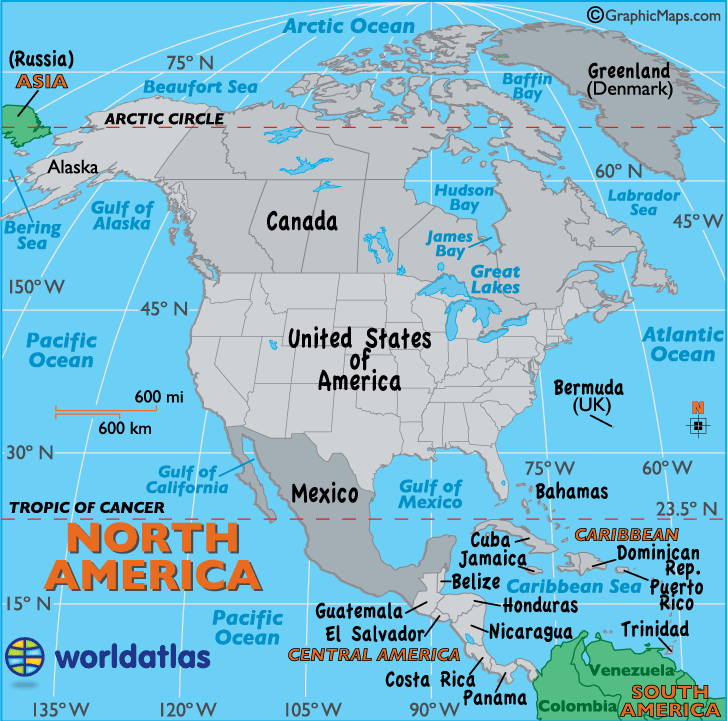
| Sovereign Countries | 23 |
|---|---|
| Area (km2) | 24,709,000 km2 |
| Area (mi2) | 9,540,000 mi2 |
| Population | 579,024,000 |
| Population Density | 23 km2 |
| GDP (PPP) | $26.03 Trillion |
| GDP per Capita | $49,240 |
| Description | |
| North America is the third largest continent in the world by land area. By population, it is the fourth largest. Sometimes considered to be a subcontinent of the Americas, North America is found entirely in the northern hemisphere and is bordered by the Arctic Ocean in the north, the Atlantic ocean in the east, the Pacific Ocean in the west, and South America to the south. North America is home to the longest land border in the world, which is shared between Canada the the United States. | |
| Read more about North America → | |
South America
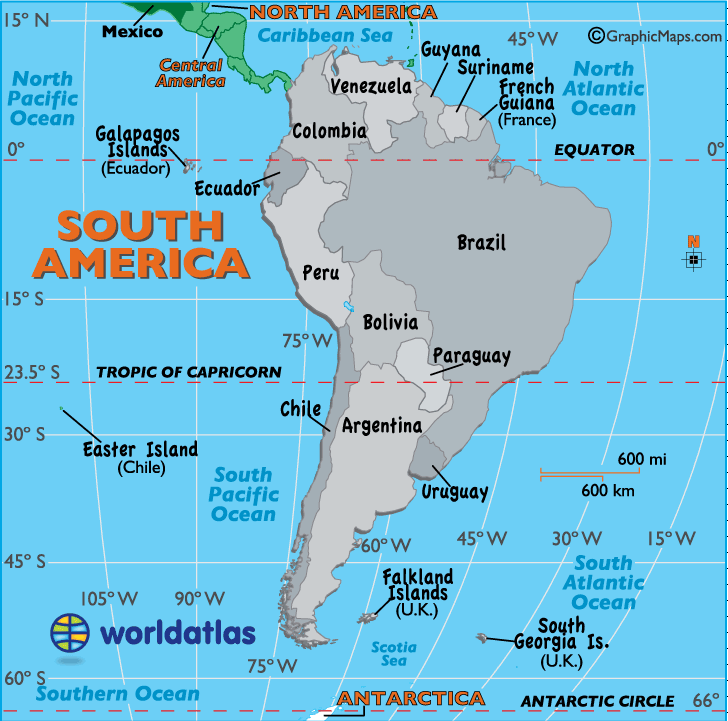
| Sovereign Countries | 12 |
|---|---|
| Area (km2) | 17,840,000 km2 |
| Area (mi2) | 6,890,000 mi2 |
| Population | 423,581,078 |
| Population Density | 21 km2 |
| GDP (PPP) | $6.92 Trillion |
| GDP per Capita | $8,560 |
| Description | |
| South America is the world’s fourth largest continent by land area, and the world’s third most populous. It is mostly situated in the southern hemisphere, with the exception of a small area of the northernmost portion of the continent. It is found completely in the western hemisphere. South America is bordered by the Atlantic Ocean in the east, the Pacific Ocean in the west, the Southern Ocean in the south, and North America in the north. | |
| Read more about South America → | |
Europe
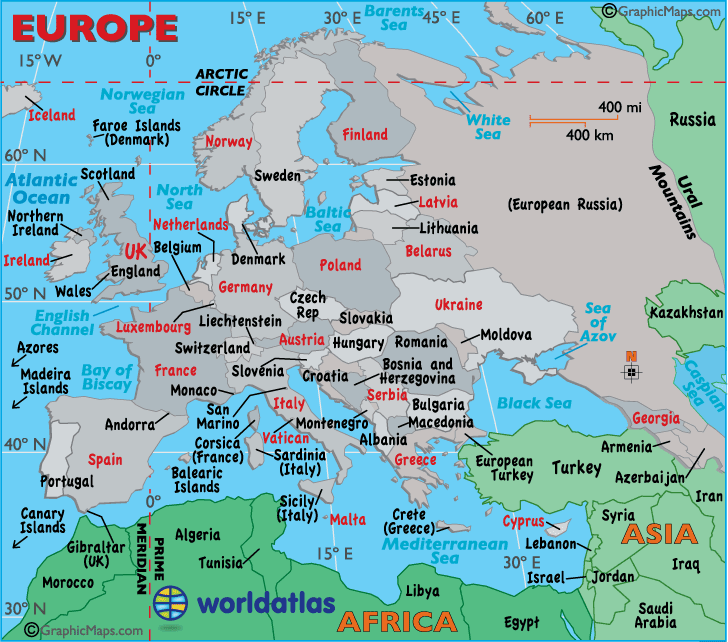
| Sovereign Countries | 50 |
|---|---|
| Area (km2) | 10,180,000 km2 |
| Area (mi2) | 3,930,000 mi2 |
| Population | 746,419,440 |
| Population Density | 73 km2 |
| GDP (PPP) | $29.01 Trillion |
| GDP per Capita | $29,410 |
| Description | |
| Europe is the world’s third most populated continent, and the sixth largest continent by land area. Although physically connected to Asia, Europe has historically been considered a separate continent due to cultural and linguistic differences. The Ural and Caucasus Mountains are generally thought to be the eastern boundary of Europe. The other borders of Europe include the Black Sea and the Mediterranean Sea to the south, the Arctic Ocean to the north, and the Atlantic Ocean to the west. Europe is home to more than 10% of the world’s population. | |
| Read more about Europe → | |
Africa

| Sovereign Countries | 54 |
|---|---|
| Area (km2) | 30,370,000 km2 |
| Area (mi2) | 11,730,000 mi2 |
| Population | 1,275,920,972 |
| Population Density | 36 km2 |
| GDP (PPP) | $7.16 Trillion |
| GDP per Capita | $1,930 |
| Description | |
| Africa is the world's second largest continent by both land area and population. The equator runs through Africa in the middle of the continent. Around one third of Africa is located in the Southern Hemisphere. Africa makes up about 20% of the world’s total land area. The Indian Ocean, the Atlantic Ocean, the Mediterranean Sea and the Red Sea all surround Africa, to the east, west, and north respectively. | |
| Read more about Africa → | |
Asia
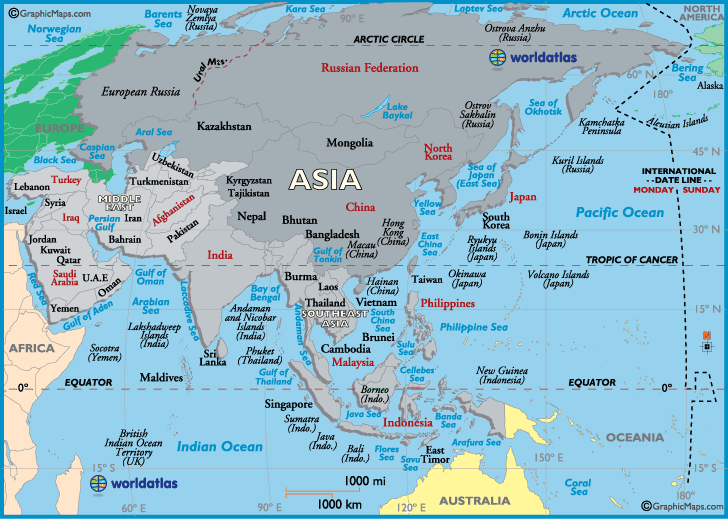
| Sovereign Countries | 48 |
|---|---|
| Area (km2) | 44,579,000 km2 |
| Area (mi2) | 17,212,000 mi2 |
| Population | 4,560,667,108 |
| Population Density | 100 km2 |
| GDP (PPP) | $65.44 Trillion |
| GDP per Capita | $7,350 |
| Description | |
| Asia is the world’s largest continent both by population and by land area. Comprising of 30% of the world’s land area, Asia borders the Pacific Ocean in the east, the Arctic Ocean in the north, the Indian Ocean in the south, and Europe to the west. Around 60% of the world’s population lives in Asia. | |
| Read more about Asia → | |
Oceania
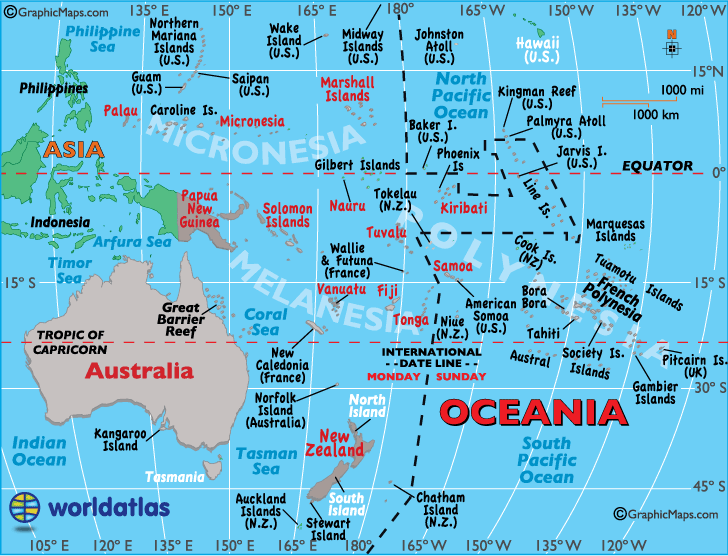
| Sovereign Countries | 14 |
|---|---|
| Area (km2) | 8,525,989 km2 |
| Area (mi2) | 3,291,903 mi2 |
| Population | 41,570,842 |
| Population Density | 4 km2 |
| GDP (PPP) | $1.62 Trillion |
| GDP per Capita | $41,037 |
| Description | |
| Australia is the world’s smallest continent and second least populated. The term Oceania is also used to describe this region in order to differentiate it from the country of Australia. However, Oceania is not a continent but is instead a continental grouping. The term Australasia is also sometimes use to refer to this region. Countries included in the Australian continent include Australia, Papua New Guinea, and portions of Indonesia. | |
| Read more about Oceania → | |
Antarctica
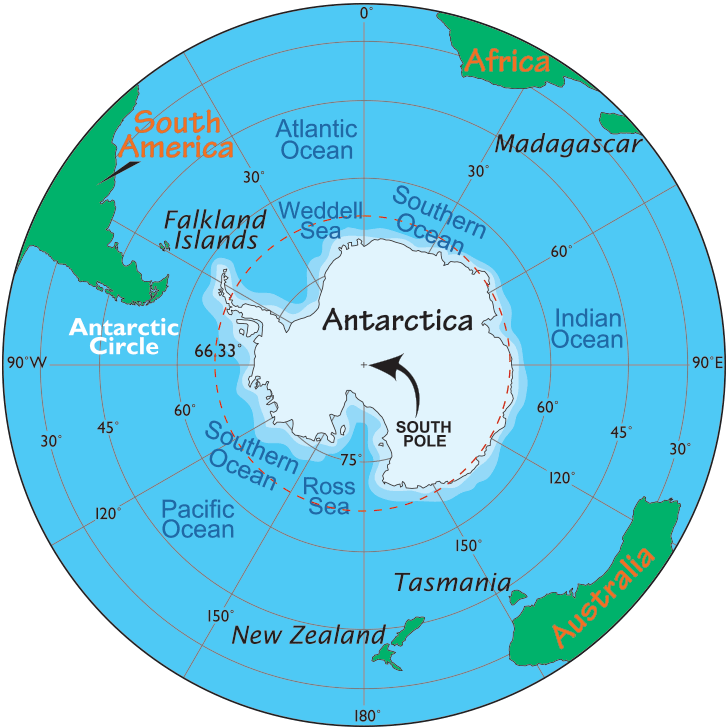
| Sovereign Countries | N/A |
|---|---|
| Area (km2) | 14,200,000 km2 |
| Area (mi2) | 5,500,000 mi2 |
| Population | 1,000 |
| Population Density | 0 km2 |
| GDP (PPP) | N/A |
| GDP per Capita | N/A |
| Description | |
| Located at the South Pole, Antarctica has no permanent population and no countries. It is reserved for use as a scientific base. Antarctica is the fifth largest continent by land area, and the least populated continent. Antarctica is an island, and is completely surrounded by the Southern Ocean. | |
| Read more about Antarctica → | |
Other Continental Divisions
Four Continents
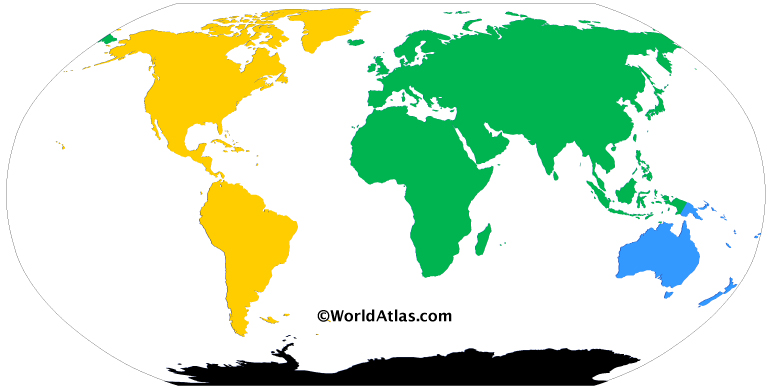
| Continents |
|---|
| Afro-Eurasia / Old World |
| America / New World |
| Australia / Oceania |
| Antarctica |
| More Information |
|
The four continent model promotes the idea that all continents are landmasses divided by ocean. As Europe and Asia inhabit the landmass, and Africa and Asia are connected by the Isthmus of Suez, they are considered to compose one continent called “Afro-Eurasia.” In this model, North America and South America are thought of as one continent connected by the Isthmus of Panama. |
Five Continents
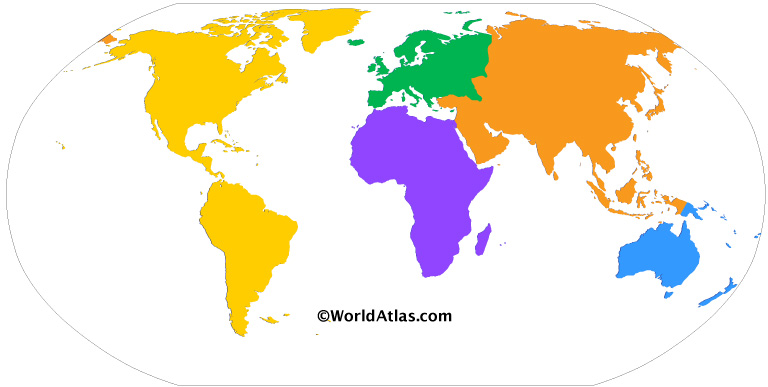
| Continents |
|---|
| Africa |
| Europe |
| Asia |
| America |
| Pacific |
| More Information |
|
In the five continent model, North and South America are considered to be one continent called America. Antarctica is omitted due to its lack of permanent habitation. This model is used by the United Nations and found in the Olympic Charter. |
Six Continents (Version 1)
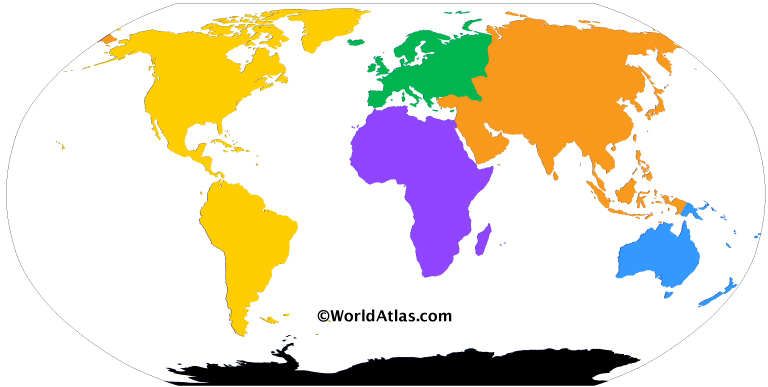
| Continents |
|---|
| Africa |
| Europe |
| Asia |
| America |
| Australia / Oceania |
| Antarctica |
| More Information |
|
This model is most commonly taught in western Europe, including France and Spain. Here, North and South America are considered to be one single continent of America. |
Six Continents (Version 2)
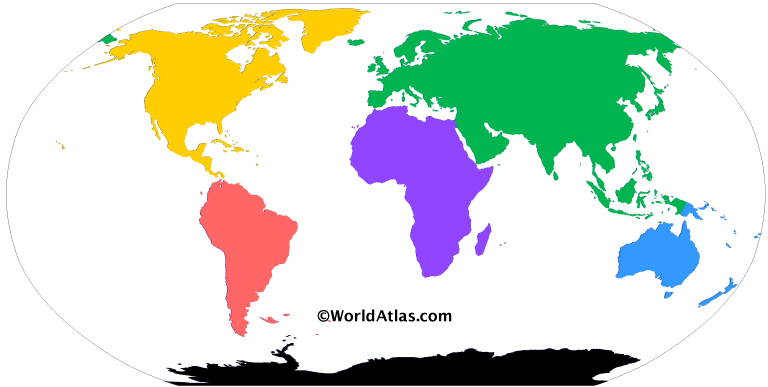
| Continents |
|---|
| Africa |
| Eurasia |
| North America |
| South America |
| Australia / Oceania |
| Antarctica |
| More Information |
|
This model is mostly taught in Eastern Europe and Japan. In this model, North and South America are differentiated by Europe and Asia are combined in one continent of Eurasia. |
Seven Continents
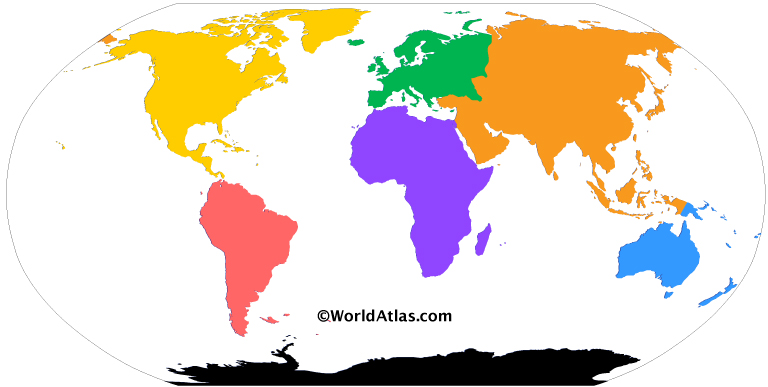
| Continents |
|---|
| Africa |
| Europe |
| Asia |
| North America |
| South America |
| Australia / Oceania |
| Antarctica |
| More Information |
The seven continent model is the most popularly accepted model. It is most commonly taught in English-speaking countries, as well as in China, India, and Pakistan. |